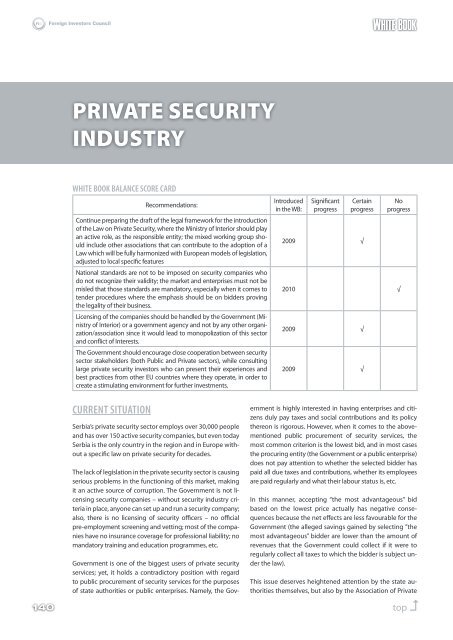Fic rEcommEndationS - Eurobank EFG
Fic rEcommEndationS - Eurobank EFG
Fic rEcommEndationS - Eurobank EFG
Create successful ePaper yourself
Turn your PDF publications into a flip-book with our unique Google optimized e-Paper software.
PRIVATE SECURITY<br />
INDUSTRY<br />
WHitE BooK BaLancE ScorE card<br />
cUrrEnt SitUation<br />
Recommendations:<br />
Continue preparing the draft of the legal framework for the introduction<br />
of the Law on Private Security, where the Ministry of Interior should play<br />
an active role, as the responsible entity; the mixed working group should<br />
include other associations that can contribute to the adoption of a<br />
Law which will be fully harmonized with European models of legislation,<br />
adjusted to local specific features<br />
National standards are not to be imposed on security companies who<br />
do not recognize their validity; the market and enterprises must not be<br />
misled that those standards are mandatory, especially when it comes to<br />
tender procedures where the emphasis should be on bidders proving<br />
the legality of their business.<br />
Licensing of the companies should be handled by the Government (Ministry<br />
of Interior) or a government agency and not by any other organization/association<br />
since it would lead to monopolization of this sector<br />
and conflict of Interests.<br />
The Government should encourage close cooperation between security<br />
sector stakeholders (both Public and Private sectors), while consulting<br />
large private security investors who can present their experiences and<br />
best practices from other EU countries where they operate, in order to<br />
create a stimulating environment for further investments.<br />
Serbia’s private security sector employs over 30,000 people<br />
and has over 150 active security companies, but even today<br />
Serbia is the only country in the region and in Europe without<br />
a specific law on private security for decades.<br />
The lack of legislation in the private security sector is causing<br />
serious problems in the functioning of this market, making<br />
it an active source of corruption. The Government is not licensing<br />
security companies – without security industry criteria<br />
in place, anyone can set up and run a security company;<br />
also, there is no licensing of security officers – no official<br />
pre-employment screening and vetting; most of the companies<br />
have no insurance coverage for professional liability; no<br />
mandatory training and education programmes, etc.<br />
Government is one of the biggest users of private security<br />
services; yet, it holds a contradictory position with regard<br />
to public procurement of security services for the purposes<br />
of state authorities or public enterprises. Namely, the Gov-<br />
Introduced<br />
in the WB:<br />
Significant<br />
progress<br />
Certain<br />
progress<br />
2009 √<br />
No<br />
progress<br />
2010 √<br />
2009 √<br />
2009 √<br />
ernment is highly interested in having enterprises and citizens<br />
duly pay taxes and social contributions and its policy<br />
thereon is rigorous. However, when it comes to the abovementioned<br />
public procurement of security services, the<br />
most common criterion is the lowest bid, and in most cases<br />
the procuring entity (the Government or a public enterprise)<br />
does not pay attention to whether the selected bidder has<br />
paid all due taxes and contributions, whether its employees<br />
are paid regularly and what their labour status is, etc.<br />
In this manner, accepting “the most advantageous” bid<br />
based on the lowest price actually has negative consequences<br />
because the net effects are less favourable for the<br />
Government (the alleged savings gained by selecting ”the<br />
most advantageous” bidder are lower than the amount of<br />
revenues that the Government could collect if it were to<br />
regularly collect all taxes to which the bidder is subject under<br />
the law).<br />
This issue deserves heightened attention by the state authorities<br />
themselves, but also by the Association of Private<br />
140 top �




